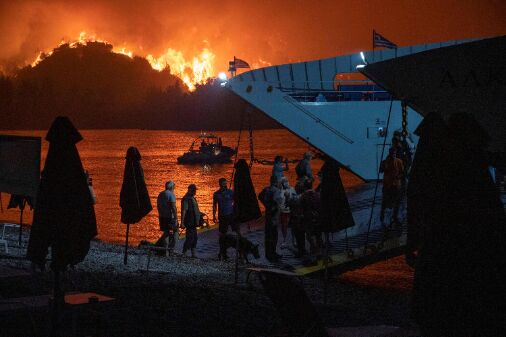Question of human existence

The alarm bells are deafening" warned the UN Secretary-General Antonio Guterres. He was talking about the sixth assessment report by the Intergovernmental Panel on Climate Change (IPCC). The extensive report established a clear link between human activity-induced climate change and the extreme weather events the world has been witnessing for the past few years — putting an end to the debate whether or not the extreme events are a fallout of climate change. Some three decades ago, the IPCC had warned the world, through its first assessment report, about the climate catastrophes resulting from climate aberrations. And now, it is out with its sixth report which leaves no scope for procrastination. If we look through the practical lens, the IPCC report is effectively a scientifically proven affirmation of the threats we have been facing more vigorously than ever before. The report, which is a result of extensive and collaborative efforts of the best of environmental scientists over the past eight years, is high on credibility. It has come after consideration of 14,000 scientific studies and has been approved by 195 countries. Further, its findings are very much in sync with what our bare eyes are exposed to. Wildfires, heatwaves, massive downpours and resultant deluges etc. have inevitably grabbed the headlines all across the world — documenting the loss of lives and property. It is a disheartening coincidence that at the time the report has come, thousands in Greece and California are being affected by the wildfires — not to mention the greenery and wildlife losses. The wounds inflicted by massive flooding in Germany, China, India etc. are still fresh. Close home, we have witnessed back-to-back severe cyclones along both the eastern and western coastline. Disproportionate rainfall and massive flooding have severely affected regions in Maharashtra, Kerala, Karnataka, Bihar etc. We have harrowing memories of cloudbursts. Not to forget the regions surrounding Vidarbha in central India where both water scarcity and deluges are collectively a round-the-year affair. The IPCC report says that these extreme weather events will get worse over the coming years. It is difficult to conceive a situation that could be worse than the present. What is even worse is that most of the changes being inflicted on nature may not be reversed. Humans are already forcing themselves and the entire planet to suffer irreparable losses. The solution it seems is no less than walking the tightrope as the options are acutely limited. At the centre of the problem are climate change and global warming — which depend on carbon emissions, methane emissions and other greenhouse gases emissions. The solution is envisioned and targets have been set to reduce carbon emissions and limit the global rise in temperature within a certain threshold. The major roadblock is who cuts emissions to what extent. While there is consensus over the need to cut carbon emissions, there seems to be some covert internal tension among all the nations. The need to cut emissions is contested by the energy needs of the nations. Developing countries, including India, argue about historical inequity, in terms of carbon footprint, existing between developed and developing nations. The argument has a substantial basis as it is not just about intent but also about capabilities. There are many developing nations with growing energy needs that cannot make a straightaway shift from non-renewables to renewables, due to financial and infrastructural constraints. Further, there is also a behavioural factor among the masses which cannot be changed overnight. These developing countries are usually the worst hit either due to their geographical position or the lack of basic healthcare and related infrastructures. It is in this context that the developed nations must assume greater responsibility. Apart from the international conferences and politics around the issue, it depends upon how countries make balanced investments and communicate internally to build renewable capacities and convince masses to use sustainable options of energy. The IPCC report has played its part by giving a final call before everything goes out of hand. It is now up to the governments to shape the prospects of the present and future generations. This is the time when nations should shed suspicion towards each other and understand the limitations and apprehensions of each other. There is also a need for a more people-centric approach that would complement the administrative decisions of individual countries. The bottom line is that the problem has to be solved for human existence at any cost. Let us collaborate, trust each other and head towards the solution.



